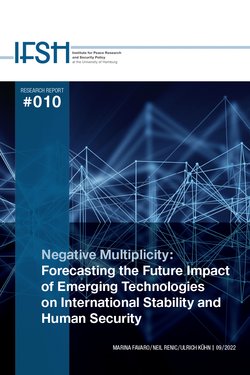Negative Multiplicity: Forecasting the Future Impact of Emerging Technologies on International Stability and Human Security
Research Report #010
The military applications of a new generation of technologies have given rise to significant concerns regarding their potential impact on international stability and human security. Meanwhile, decision makers who aim to mitigate these concerns through arms control measures face an uphill battle: the speed of technological innovation, the unclear impact of emerging technologies, and intensifying military-technological competition between the United States and Russia and China are impeding effective arms control for emerging military technologies.
This report is the capstone of a one-year study with the objective of forecasting the impact of emerging technologies on international stability and human security. It answers three questions:
- What impacts are emerging technologies likely to have on arms race stability, crisis stability, and humanitarian principles up to 2040?
- Which emerging technologies show similarities in terms of impact?
- When will the impact of these technologies become most acute?
The authors asked 30 international experts to evaluate the military applications of twelve emerging technologies. First, they had them to assess the current and expected maturity of each technology over the next twenty years. They then asked them to answer 54 questions about each technology’s anticipated positive and negative impact and gave them an opportunity to provide qualitative comments. The authors limited the questions on arms race and crisis stability to the U.S.–Russian and U.S.–Chinese nuclear dyads insofar as they expect these countries to have an outsized influence on peace and security over the next twenty years. They then applied a machine learning algorithm to cluster all the quantitative data points from the survey (~8,000) to identify similarities and differences between the technologies’ effects. This process helped them to identify five technology clusters, which they visualised in three-dimensional graphs on an accompanying webpage. The study concluded with the collection of a second round of qualitative data from experts’ debriefs.
This study reveals a combined effect that the authors term ‘negative multiplicity’. Negative multiplicity reflects the predominantly negative, concurrent, and in some cases similar, first- and second-order effects that emerging technologies are expected to have on international stability and human security.
ABOUT THIS PROJECT
The research and transfer project ‘Arms Control and Emerging Technologies’ examines the status, functions, and strengthening of arms control, disarmament, and the control of emerging technologies. It is funded by the German Federal Foreign Office.






